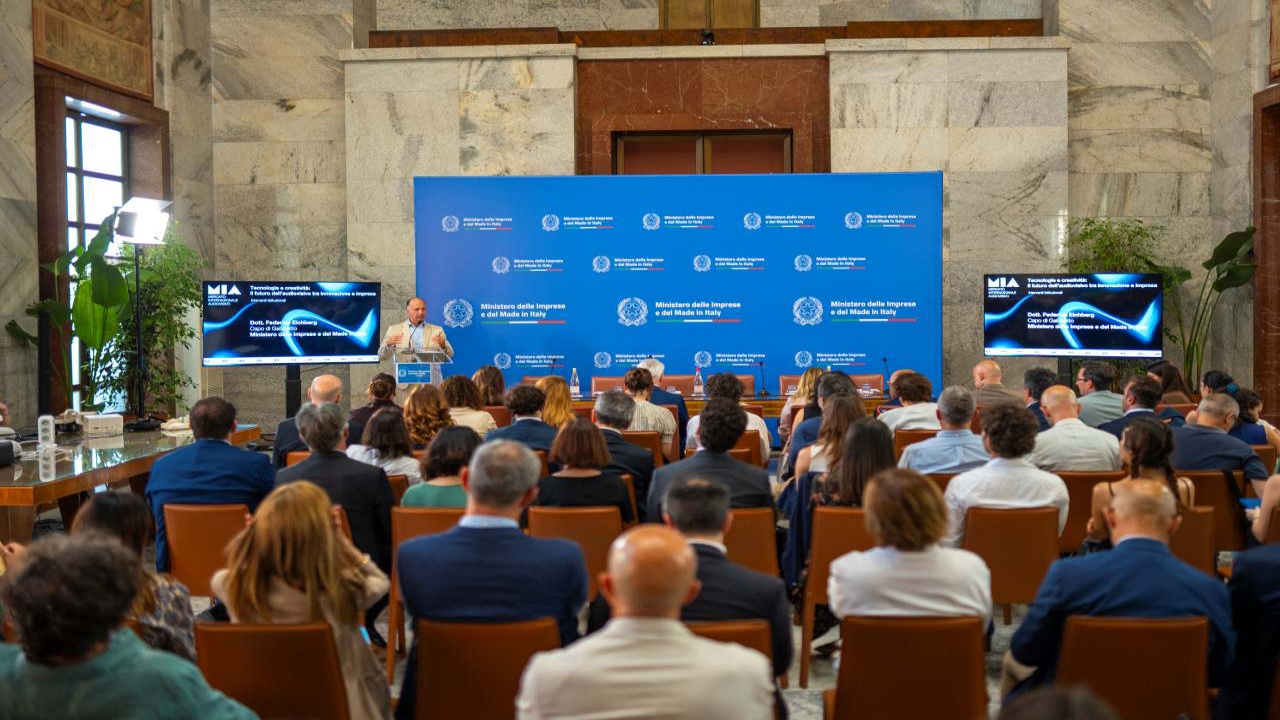On June 30, 2025, the Italian Ministry of Enterprises and Made in Italy (MIMIT) hosted the event Technologies and Creativity: The Future of Audiovisual Between Innovation and Enterprise, promoted by MIA in collaboration with the Ministry.
Stakeholders in the audiovisual system discussed the role of immersive technologies in transforming the cultural industry, highlighting the dynamism and potential of the Italian technological ecosystem. At the core of the discussion were the adoption of immersive technologies, the training of new talent, and the emergence of new storytelling scenarios and production and distribution models for XR works.
The event opened with speeches by the Hon. Federico Mollicone, President of the Committee on Culture, Science, and Education of the Chamber of Deputies; Federico Eichberg, Chief of Staff to Minister Adolfo Urso (MIMIT); Eva Spina, Head of the Department for Digital, Connectivity and New Technologies at MIMIT; Chiara Sbarigia, President of APA – (Italian Audiovisual Producers Association; and Alessandro Usai, President of ANICA – (Italian Association of Film, Audiovisual and Digital Industries.
MIA curated the panel Funding, Production, and Distribution of XR: Innovation at the Service of Creativity, moderated by MIA’s Director Gaia Tridente. The panel brought together prominent voices from the Italian and European audiovisual scene to address the challenges and opportunities related to XR content production and distribution. Gabriella Buontempo, President of the Centro Sperimentale di Cinematografia Foundation – CSC, and Jacopo Chessa, Director of the Veneto Film Commission and President of the Italian Film Commissions, provided insights into the role of institutions and territories in supporting immersive works. Rémi Guittet, Audiovisual Attaché at the Institut Français in Italy – Embassy of France, emphasized the cultural synergies between Italy and France in the field of new technologies, while Maria Cristina Lacagnina, from the Creative Europe Desk Italy MEDIA at Cinecittà, presented European funding tools. Finally, Carlo Rodomonti, Head of Strategic and Digital Marketing at Rai Cinema and President of the ANICA Union of Digital Publishers and Creators, analyzed promotion and distribution strategies. Together, the speakers explored the essential contribution of institutions in promoting innovation and creativity in the XR sector.
The MIA panel Immersive Imaginaries and Audiovisual: The Evolution of XR Between Industry, Culture, and Market, also moderated by Gaia Tridente, offered a rich reflection on the narrative potential of immersive technology while addressing the challenges tied to the development, production, and distribution of XR works. Speakers included Maria Grazia Mattei, Founder and President of the MEET Digital Culture Center; Valentina Temporin and John Volpato, Founders and CEOs of ULTRA; Agata Di Tommaso, Festival Manager at Diversion; Francesco Dobrovich, Creative Director at Videocittà; and Agnese Pietrobon, Consultant and Writer for XR Must. They contributed diverse experiences and perspectives, examining the emerging role of XR producers in new creative and industrial processes. The evolution of immersive storytelling, its impact on audiences, and ongoing transformations in content consumption spaces were analyzed. Together, they discussed successful models and future opportunities for the audiovisual and immersive content supply chain, from production to distribution and circulation.
The MIMIT-led panel Opportunities and Challenges for the Development of New Immersive Technologies in the Italian Audiovisual Sector: The Ecosystem of the ‘Houses of Made in Italy’ and ‘Houses of Emerging Technologies’ was moderated by Dr. Elvira Raviele, Senior Officer at the MIMIT Cabinet Office. It explored the role of these “Houses” in supporting technological innovation and XR sector growth through infrastructure and initiatives across the national territory. Participants included Carmela Smargiassi, Director of the Tuscany House of Made in Italy; Fabiola Gallo, Head of Coordination for the Houses of Made in Italy and Business Innovation; Anna Follo, Digital Officer at the Torino Museums Foundation; Stefano Murciano of the Rossini Opera Festival; Sergio Castiglia, XR/VR Specialist at MedItech; and Luigi Atzori, Professor at the University of Cagliari.
During the conference, a demonstration area showcased VR prototypes and immersive projects funded by MIMIT, with support from the CTE – Houses of Emerging Technologies in Turin, Naples, Prato, Pesaro, Cagliari, and Matera.
The day concluded with a pitching session presenting projects developed within the network of the Houses of Made in Italy and the Houses of Emerging Technologies – from theater with holographic technologies and museum metaverses to immersive experiences integrated with artificial intelligence for the enhancement of cultural and industrial heritage.
This event is part of MIA’s Innovation for the Creative Industries program, an initiative designed to explore the sector’s transformation through emerging trends and technologies. For its eleventh edition, taking place in Rome from October 6 to 10, 2025, MIA will once again offer a platform to spotlight how technological innovation is reshaping production, distribution, and creative models within the audiovisual industry.

